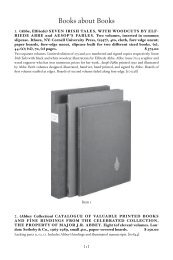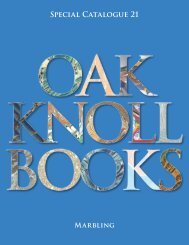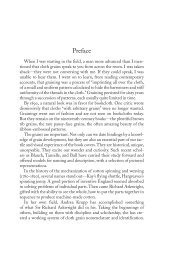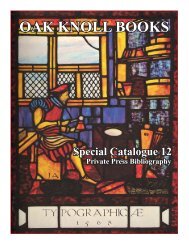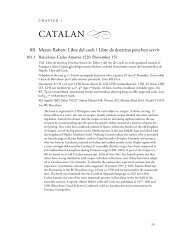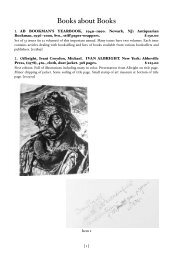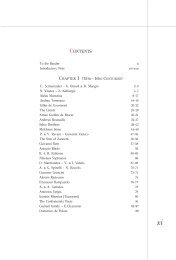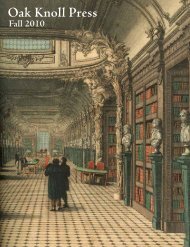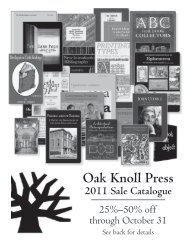Download Printable PDF (3.48 MB) - Oak Knoll Books
Download Printable PDF (3.48 MB) - Oak Knoll Books
Download Printable PDF (3.48 MB) - Oak Knoll Books
You also want an ePaper? Increase the reach of your titles
YUMPU automatically turns print PDFs into web optimized ePapers that Google loves.
12 <strong>Oak</strong> <strong>Knoll</strong> Press<br />
<strong>Books</strong> as History<br />
The Importance of <strong>Books</strong> Beyond Their Text<br />
by David Pearson<br />
This third edition of David Pearson’s <strong>Books</strong> as History includes a<br />
new foreword, an updated list of further reading, and various other<br />
additions and updates. Updated in light of the recent development<br />
of the e-book, this version will offer new ideas on the life of the<br />
book, and thoughts on how the book will survive.<br />
<strong>Books</strong> have been hugely<br />
important in human civilization<br />
as instruments for communicating<br />
information and ideas.<br />
The digital age has caused the<br />
landscape of books to change,<br />
with more and more of the traditional<br />
functions of books being<br />
performed electronically. People<br />
usually think of books in terms of<br />
their contents or texts, but in fact,<br />
books possess all kinds of potentially<br />
interesting qualities beyond<br />
their texts as designed or artistic<br />
objects with unique properties<br />
deriving from the ways they have<br />
been printed, bound, annotated, beautified, or defaced.<br />
David Pearson explores these themes and uses many examples of books from the Middle Ages to the present day to show<br />
why books are interesting beyond their texts. As the format of the book becomes history and as texts are increasingly communicated<br />
electronically, we can recognize that books are also history in another significant way. <strong>Books</strong> can develop their own<br />
individual histories that provide important evidence about the way they were used and regarded in the past, making them an<br />
indispensable part of the fabric of our cultural heritage. This book raises<br />
awareness of an important aspect of the life of books in the context of the<br />
ongoing debate about their future. Extensively illustrated with a wide<br />
range of images, it is not only approachable but also thought-provoking.<br />
David Pearson is Director of Culture, Heritage and Libraries at<br />
the City of London Corporation, with extensive experience of managing<br />
and working in major research collections. He is also a respected<br />
scholar in the field of book history, whose articles and books have<br />
focused on various aspects of the ownership and binding of books.<br />
2012, paperback, 8.75 x 9.5 inches, 208 pages<br />
ISBN 9781584563150, Order No. 109790, $29.95<br />
Available outside North and South America from The British Library<br />
Available in November 2012<br />
“The whole effort is richly illustrated with the kind of superlative examples that one might imagine at the command of a<br />
London bookman at the top of his game. <strong>Books</strong> as History is an absolute must for all libraries supporting information science<br />
or the study of book history. Schools with strong liberal arts programs will want to add this to their collections as well.”<br />
– P.L. Holmer, Southern Connecticut State University, CHOICE<br />
Available online at www.oakknoll.com/fall2012



